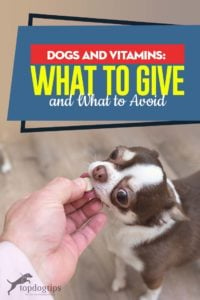Giving dogs vitamins is a highly debatable subject for many pet owners, and they aren't the only ones – veterinarians are also divided on the topic.
If you believe your pooch to be deficient in vitamins, should you supplement their diet with additional vitamins in pill form? It's a simple question that doesn't have a simple answer. Many veterinarians can't also give a clear yes or no for this question because dogs have different nutritional needs that we haven't yet studied well enough.
Some vets might tell dog owners that consistently feeding a pet properly balanced diet is enough. Unless the dog has been sick and weak, or is recovering after surgery or serious illness, or has been diagnosed with a vitamin deficiency, then there's no need to give vitamin supplements. It's unlikely that they will assimilate in the dog's body anyway.
If you still feel, however, that you must give your pooch vitamins in pill form because you believe his diet is lacking in certain part of essential nutrition, it would be best to get yoru Fido go through physical examination first. This way, the veterinarian can properly guide you on what's the best vitamin to give your pet based on the tests, and also how to avoid overdosing on vitamins or wasting money on useless pills.
Where Do Dog Vitamins Come From?
 Manufacturers, especially the most reputable ones, formulate dog foods that provide complete nutrition, vitamins, and minerals. Since dogs basically eat the same meals every day, unlike humans, it's assumed that if you keep feeding your Fido this same nutritionally balanced meal, then giving vitamin supplements may not be necessary.
Manufacturers, especially the most reputable ones, formulate dog foods that provide complete nutrition, vitamins, and minerals. Since dogs basically eat the same meals every day, unlike humans, it's assumed that if you keep feeding your Fido this same nutritionally balanced meal, then giving vitamin supplements may not be necessary.
Moreover, you might be feeding your dog vitamins that aren't exactly healthy and harder to process for the pet's body. According to holistic vets at Dogs Naturally Magazine, many vitamins and supplements for dogs are not made the same way as human vitamins. These products come from hydrogenated sugars and waste products from industrial products in coals and mines.
While some poorly manufactured vitamins may contain ingredients like formaldehyde and even cyanide, as well as plenty of preservatives so that the vitamins can be stocked in store shelves for months or years, there's a number of popular vitamins for dogs that are highly reviewed by pet owners and are much safer (but it doesn't mean they're useful).
Some dog vitamins sold in the U.S. are also made from China, which means these are likely synthetic products. China is known for having terrible or even no quality control when it comes pet products. Unfortunately, this means that only two or so percent of dog vitamin products made in that market are inspected for health and safety contents.
ALSO READ: 12 Facts About Dog Food Made in China [Infographic]
How a Dog’s Body Responds to Vitamins
Dogs will only eliminate Vitamin C and B-complex in their body just as soon as they pee because these are water-soluble vitamins. According to PetMD, Vitamin C is really just expensive pee for dogs, so you may as well skip this (and choose to feed natural foods with Vitamin C instead). Vitamin B-complex won’t really address and improve a dog’s health issues because it will easily dissolve in the dog’s body as well.
Some forms of fat-soluble Vitamins A, D, E and K, on the other hand, may even be toxic for dogs in the long run since their body cannot eliminate these in the system very well. If your dog is eating a balanced meal, then it's generally better to skip these vitamins to avoid an overdose.
Where to Get Real Vitamins for Your Dog
 Real vitamins are found in real food. However, if you're making homemade dog food meals, due to calorie counting, it might be harder to make those dishes balanced and include all essential vitamins without overfeeding the dog (that's much easier with commercial kibble).
Real vitamins are found in real food. However, if you're making homemade dog food meals, due to calorie counting, it might be harder to make those dishes balanced and include all essential vitamins without overfeeding the dog (that's much easier with commercial kibble).
Still, there's a way to do that and Samantha published a video explaining which supplements are to be used in homemade recipes.
When it comes to specific foods that are full of vitamins, great sources are both lean and fatty fish (and fish oil), liver. Then, it's also veggies and fruits in moderation. There are also herbs like alfalfa, nettle, garlic (small amounts), and kemp that you can include in your dog's meals without adding too many calories.
If you wish to feed your dog a well-balanced diet of homemade meals, the most optimal option might to be mix kibble with home prepared foods. That way you get the goods from both worlds.
But what if your vet prescribes your pooch vitamin supplements for a specific reason, such as to prevent a development of inherited disorders or help deal with a disease? The option of buying vitamins in supplement form is still there, but make sure that these come from reputable manufacturers, are well reviewed and vet recommended.
One way to speculate whether your dog is responding well to the vitamin supplement you're currently including in his diet is to monitor his pee. If it's too yellow and has an odor, then it's likely that he's not taking all the nutrients in and just peeing them out. The best way is to do regular vet check-ups where your pupper would get tested.
How to Give Your Dog Vitamins
 Dogs don’t know how to swallow vitamins and might not even take the pill in most cases. Many pet owners add pills to dogs' food so they won’t notice. They will be too hungry to eat the food anyway, and if hidden well, it's a great strategy. That isn't always possible, however, particularly when you need to give a lot of pills or several times throughout the day. In that case, you can use pill pocket treats to trick your pooch.
Dogs don’t know how to swallow vitamins and might not even take the pill in most cases. Many pet owners add pills to dogs' food so they won’t notice. They will be too hungry to eat the food anyway, and if hidden well, it's a great strategy. That isn't always possible, however, particularly when you need to give a lot of pills or several times throughout the day. In that case, you can use pill pocket treats to trick your pooch.
Some pet owners claim that they take advantage of the pack mentality and give those vitamins as the reward for following a command, tricking the dog into thinking it's a treat. This will work if you have more than one dog in the house and probably until the figure out your tricks. For more tips on how to give a dog vitamins, check out Samantha's guide in the below link.
READ NEXT: How to Give a Dog Medicine and Vitamins













